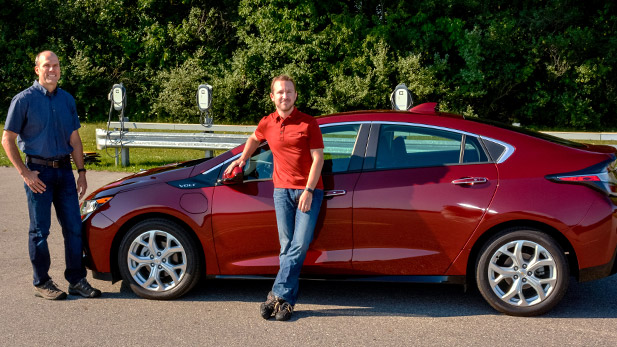Alumni Driving Electric Vehicle Technology

Greg Hubbard, a 1994 mechanical engineering alumnus (left), and Anthony Heap, a 1997 mechanical and electrical engineering graduate have helped develop technology essential to General Motors’ electric vehicles division.
General Motors has ambitious plans for all-electric vehicle technology – hoping to add two new cars to its lineup within the next 18 months – and Rose-Hulman alumni are helping propel those advances.
Greg Hubbard is chief engineer for GM’s Volt Propulsion Systems, while Anthony Heap is global technical specialist for the automaker’s electrification propulsion controls program. They spent years working on hybrid drive technology that’s powering city buses throughout the world before re-energizing GM’s consumer electric vehicle business.
Meanwhile, mechanical engineering alumnus Matthew Leach is vice president of operation for Essex Group Inc.’s Magnet Wire North America. He has worked with Hubbard and Heap to develop some of the technology inside the electric motors powering GM’s electric vehicles.
“We intend to be the first to market a 200-plus mile electric vehicle at a price that’s affordable,” Hubbard says, referring to the 2017 Bolt EV, an all-electric Chevrolet that will whisper off dealer’s lots for as little as $30,000, after factoring in federal tax credits.
Hubbard and Heap got their first taste of alternative energy technology as members of Rose-Hulman’s solar car teams in the 1990s. Hubbard was part of the team that competed in the Sunrayce 93 cross-country road competition, while Heap was a member of two other teams, including being mechanical team leader for the institute’s Sunrayce 97 entry. Heap now has nearly 200 patents for his work in developing electronic controls that maximize performance and minimize power consumption.
“[The Solar Phantom Team] was a good introduction to what we have been doing now in the industry,” says Heap.
GM Chairman and Chief Executive Officer Mary Barra recently announced plans for the automaker to have at least 20 new zero-emission electric vehicles available for consumers by 2023. Success in developing the Bolt EV and its companion Chevy Volt, with an all-electric range of 53 miles on a single charge, are a major reason for this optimism. The Volt also has a range-extending gasoline backup option.
“Research says about 80 percent of trips with a Volt are all-electric,” points out Hubbard, a 1994 mechanical engineering alumnus. Customers appreciate the comfort level of the Volt’s gasoline backup—and they’re likely to really be pleased by the Bolt’s more than 200-mile capability.
Heap, a 1997 mechanical engineering and electrical engineering alumnus, points out that the newfangled electric cars have peppy drivability characteristics. “Electric vehicles drive better. They’re more responsive, smoother, and quieter,” he says.
“A lot of people are realizing that you can get higher performance out of an electric motor,” agrees Leach. “I do foresee that it is going to be the technology of the future, moving forward. There are a lot of benefits.”
Yes, Hubbard acknowledges, being at the forefront of electric car work has been “quite a ride.”

